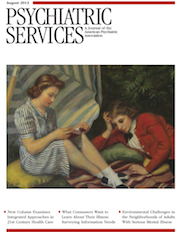Rate and Predictors of Service Disengagement Among Patients With First-Episode Psychosis
Abstract
Objective
This study determined the rate of service disengagement among patients in the Early Psychosis Intervention Program (EPIP) in Singapore and predictors of disengagement.
Methods
EPIP is a two-year multidisciplinary program targeting first-episode psychosis. The sample comprised patients consecutively accepted (2001–2009) who had two years of follow-up data. Disengagement was assessed with a semistructured scale. Sociodemographic and clinical variables were assessed with the Structured Clinical Interview for DSM-IV Axis I Disorders, the Positive and Negative Syndrome Scale, and the Global Assessment of Functioning. Regression analyses were conducted.
Results
Among 775 patients, 109 (14%) disengaged from EPIP within two years. Significant baseline predictors included Malay ethnicity (odds ratio [OR]=1.93, 95% confidence interval [CI]=1.12–3.29) and less than six years of education (OR=2.30, CI=1.23–4.29).
Conclusions
EPIP’s engagement strategy should focus on patients of Malay ethnicity and of low educational attainment. Further studies should examine how these factors affect service disengagement.



